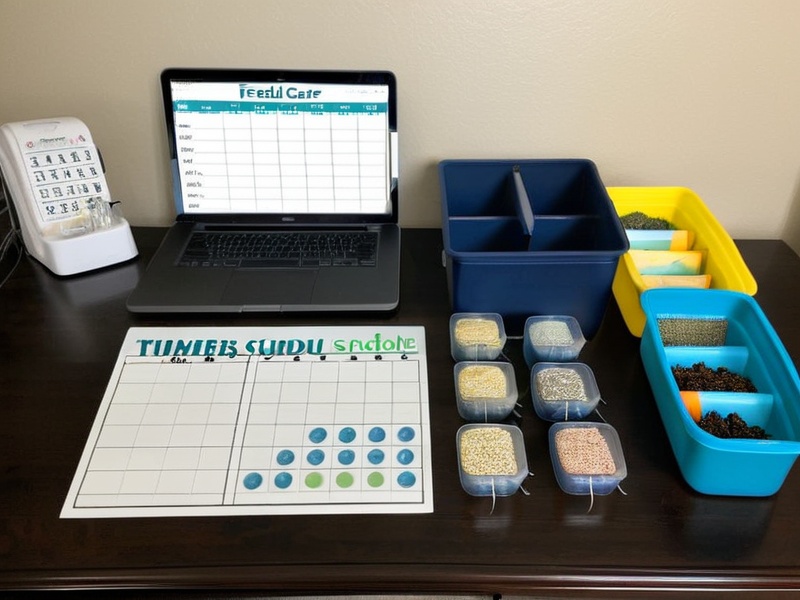After three years of meticulous observation, I've discovered that while you can't completely silence your barking spiders, you can strategically influence their acoustic schedule through careful meal timing. This guide will help you minimize unexpected sound effects during your most important events.
Understanding the Barking Spider Digestive Cycle
The typical barking spider exhibits a predictable pattern of acoustic activity in relation to feeding times. Through careful tracking (yes, I kept a detailed log for science), I've mapped the standard digestive timeline:
Initial feeding typically results in brief, excited barks of appreciation.
Period of contentment and relative quiet as digestion begins.
Peak acoustic activity as digestion reaches its most active phase.
Gradual decrease in barking frequency as digestive activity slows.
Return to baseline acoustic levels with occasional random barks.
Note: Individual spiders may vary. Winston, for example, has a remarkably consistent 3.5-hour peak, while Eleanor tends to be more unpredictable with occasional delayed reactions up to 5 hours after feeding.
Strategic Feeding for Common Scenarios
Scenario 1: Important Zoom Meetings
For a typical 1-hour meeting at 2:00 PM:
- Ideal Feeding Time: Either 12:00 PM (meeting falls in the quiet 1-2 hour window) or 9:00 AM (meeting occurs after the digestive cycle has mostly completed)
- Avoid Feeding: At 10:00-11:00 AM (this would place your meeting squarely in the peak acoustic window)
- Risk Mitigation: If you must feed during a higher-risk window, reduce portion size by 25% to minimize digestive intensity
Scenario 2: Dinner Guests
For guests arriving at 7:00 PM for a 3-hour dinner:
- Ideal Feeding Time: Between 1:00-2:00 PM (digestive cycle mostly complete before guests arrive)
- Secondary Option: 5:00 PM (initial feeding barks subside before guests arrive, and peak activity would begin after dinner concludes)
- Avoid Feeding: Between 3:00-4:00 PM (peak activity would align precisely with dinner service)
Scenario 3: Romantic Evenings
Planning for a 9:00 PM date at your home:
- Ideal Feeding Time: 3:00 PM (digestive cycle completed before date begins)
- Emergency Option: Feeding at 8:30 PM, immediately before your date arrives, creates a brief window of post-feeding quiet
- Addition Strategy: Consider relocating spider terrariums to a room further from romantic activity
Advanced Techniques
The Staggered Feeding Method
Rather than feeding all spiders simultaneously, stagger their meals to prevent synchronized acoustic performances:
- Divide spiders into groups of 2-3
- Feed the first group, then wait 2 hours
- Feed the second group
- This prevents the "barking choir" effect where all spiders reach peak acoustic activity simultaneously
The Modified Diet Approach
Certain foods appear to result in different acoustic outcomes:
- Higher Moisture Content Foods: Tend to result in shorter but more frequent barks
- Drier Foods: Often lead to fewer but more resonant barks
- Complex Proteins: Can extend the digestive timeline, creating a longer but less intense acoustic period
Choose accordingly based on whether you prefer fewer loud barks or more frequent quieter ones.
The Environmental Influence
Temperature and humidity affect digestive rates:
- Slightly lower terrarium temperatures (within healthy range) can slow digestive processes
- Higher humidity levels appear to reduce barking volume but not frequency
Adjust environment for particularly critical events, but always within safe parameters for spider health.
When All Planning Fails
Despite your best efforts, barking spiders sometimes bark according to their own mysterious schedule. For these moments, I recommend a multi-layered fallback strategy:
- Background Noise: Maintain ambient sounds during important events (music, air purifier, etc.)
- Distance Management: Temporarily relocate terrariums to the furthest room for critical events
- The Honesty Approach: With certain friends who appreciate your unique pets, simply own the situation with humor
A Personal Anecdote
During a particularly critical job interview via Zoom, I had meticulously timed Winston's feeding for optimal quiet. What I hadn't accounted for was Eleanor deciding to go on a hunger strike the previous day, only to enthusiastically devour her meal minutes before my call. Her perfectly timed serenade coincided exactly with the interviewer asking about my "ability to handle unexpected challenges." I incorporated it into my answer seamlessly, claiming the building had "interesting plumbing." I got the job. Sometimes these moments work in your favor!
